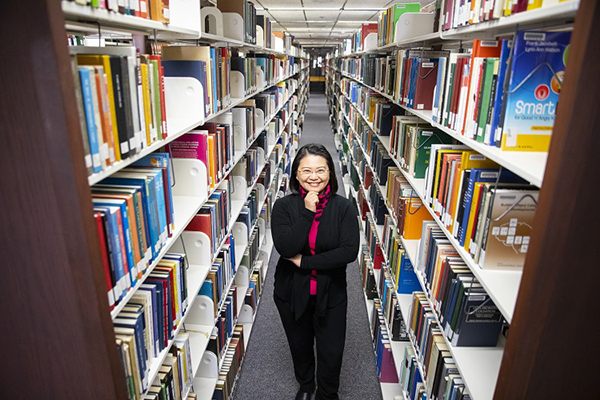
Faculty Profile: Pei-Ling Hsu
Last Updated on February 02, 2021 at 12:00 AM
Originally published February 02, 2021
By UC Staff
UTEP Communications
Pei-Ling Hsu, Ph.D., draws on her time as a high school earth science teacher to create “project-based learning” methods for her students at The University of Texas at El Paso, which they use to create engaging science projects for area K-12 students. She has taught different education courses at the undergraduate, master’s and doctoral levels. Researching is Hsu’s passion, not only because it advances knowledge, but because it plants seeds that can make a difference in people’s lives and our society. In 2015, she received The University of Texas System Regents’ Outstanding Teaching Award.

Name: Pei-Ling Hsu
Department/College: Department of Teacher Education, College of Education
What do you teach? Science Education, Educational Research
How long have you been a teacher? 13 years
What is your favorite classroom activity or teaching technique? One helpful teaching method that I have used in graduate and undergraduate courses is “project-based learning.” This pedagogical approach focuses on real-world practices, student-led inquiry, and long-term education. Project-based learning is grounded in the ideas of “learning by doing” and “situated learning” that emphasize the importance of integrating knowing and doing in contextualized environments.
For example, in my undergraduate science methods courses, I ask students to create their own lesson plan projects and implement their plans in the middle and at the end of semesters in “Science Circus Days.” Science Circus Days are public events where schools bring their students to museums to learn fun science from my undergraduate students who are preservice teachers. During Science Circus Days, my students implement the lesson plans they created and prepared in my science method courses to teach youngsters through hands-on activities. These lesson plan projects provide a real context for my students to utilize the knowledge they learned in my course and to see the real results of their projects through a child’s reactions and feedback.
For my graduate courses in informal science education, I invite my students to produce a proposal based on their own interests and expertise. They then will create a project that implements this proposal in their daily life at the end of the semester. During these hands-on practices, students digest information and utilize their creativity to produce a project that allowed them to apply the knowledge they learned from my course and so have a sense of ownership of the knowledge.
What background and experience do you have in your field of study that benefits your students? I am a former middle and high school earth science teacher and currently teach courses that relate to science education and research methodologies in higher education through the doctoral level. I received my bachelor’s degree in the field of earth science, and my master’s and doctoral degrees in science education. The University of Texas System Board of Regents named me one of its Regents’ Outstanding Teaching Award recipients in 2015.
Through partnership with different organizations to include schools, museums and after school programs, my undergraduate and graduate students helped create science projects that engaged approximately 1,300 K-12 students.
My research interests focus on informal science learning, partnerships with scientists, discourse studies, and students’ career pursuits in science. I am the co-author/editor of three books, 29 peer-reviewed journal articles, 15 book chapters, 29 conference papers and 74 presentations at international and national conferences. My publications appeared in top science education journals, such as the Journal of Research in Science Teaching, Science Education, Research in Science Education and International Journal of Science Education. In terms of grants, I received more than $2 million from various sources, such as the National Science Foundation, and UTEP’s Office of Research and Sponsored Projects and College of Education.
What do your students like best about your classes? Students appreciate my rigorous class structure that provides a challenging and fun learning environment, as well as meaningful assignments that can guide students to exercise their creativity and apply what they have learned in class to real-world applications. They also like my preparedness and availability and openness to answer questions.
What do you love most about being a teacher? I love that my students are empowered by what they learned in my classes and use it in the real world to make a change in their lives.
What are your hobbies? When you are not teaching, grading or preparing for classes, what are you doing? When I am not focused on school, I like to travel, bowl and do jigsaw puzzles. Traveling refreshes my eyes and perceptions about the world. Bowling helps discipline my precision and focus. Doing jigsaw puzzles helps relax my mind and exercise my creativity.
What is your favorite place on campus? The University Library is a unique place that calms my mind because of its sacred and silent atmosphere.
What is your favorite UTEP event, and why? I enjoy every UTEP Commencement. I especially appreciate how faculty line up at the end of the ceremony to shake students’ hands. I get to offer each graduate my best wishes for a bright future!
What advice would you give to an incoming UTEP student? Be ready to work with excellent UTEP professionals to discover your full potential that will transform your life!
